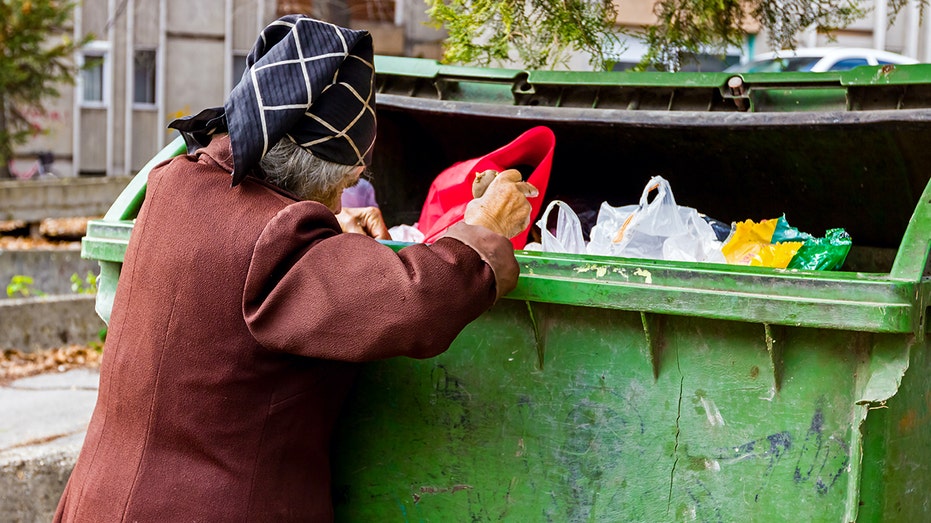Dumpster diving death highlights 'freegan' movement and its risks
Dumpster diving can positively impact the environment, but there are health and safety risks associated with 'freegan' movement
The death of a North Carolina woman whose body was found at a landfill is shedding light on the dangers of Dumpster diving.
Greensboro woman Stephanie Cox, 30, disappeared last month while she was said to collecting items from a Dumpster at nearby discount store Five Below, police said. Investigators determined that Cox never emerged from the Dumpster before it was serviced by a garbage truck. Cox’s remains were found in a landfill Monday.

North Carolina woman Stephanie Cox was found dead in a landfill after police said she was likely dumpster diving.
"This case brings to light the dangers associated with collections from dumpsters," the Burlington, North Carolina, police department said in a statement. "The commonly known practice of 'dumpster diving' is not safe."
Dumpster diving has been a common practice for decades among people aiming to reduce their carbon footprint by digging for discarded products that can be recycled as new. But there are myriad health and safety risks associated with the practice. Health experts have warned against Dumpster diving for food because it can be contaminated with bacteria when left outside for too long. Dumpsters are also sprayed with pesticides, and even washing food or martial recovered can’t thoroughly clean off contaminants, a study in the Canadian Medical Association Journal found.
"From a safety perspective, I don't recommend it," Brian Long, assistant chief at Burlington police department, told FOX Business.
FUR COATS HOT WITH MILLENNIALS, IF USED OR FAKE
The environmental effort is part of the "freegan" movement, in which people compost food and save hundreds of dollars on conventional expenses by living off the land as much as possible. Meetup groups exist across the country, calling on freegans concerned about waste and its impact on the planet, humans and animals to learn how to find usable or repairable goods in the trash -- like food, old bikes and clothing. An event on MeetUp.com is currently advertising a “Freegan Feast!” in New York City inviting vegans to make a meal together using food that was rescued from the trash.
Waste has a staggering financial burden on the U.S. economy. Indeed, Americans waste as much as $18,000 a year on non-essential expenses for things like eating out, cable services, subscription boxes and other things, a survey commissioned by Ladder and OnePoll found. And the average American spends as much as $1,497 per month on non-essential items, which can prevent them from investing in imperative things like life insurance, paying off credit card debts and owning a car, the survey found.

People have been Dumpster diving for decades to resue food and items that can be recycled or refurbished and resold.
And food is one of the No. 1 things that gets wasted, with as much as 40 percent of food uneaten in the U.S. Americans toss $165 billion in wasted food each year, according to statistics from Harvard Law School’s Food Law and Policy Clinic and the Natural Resources Defense Council, a nonprofit environmental action group.
CALIFORNIA BANS FUR STATEWIDE, BUT THE MULTIBILLION-DOLLAR INDUSTRY WON'T BE EASY TO KILL
A number of people who consider themselves professional Dumpster divers have made a fortune by being thrifty despite the safety risks. Austin, Texas-based Matt Malone has made it a full-time job, finding, refurbishing and selling discarded electronics like cameras, flat-screen monitors and printers in Dumpsters outside stores like Office Depot and Home Depot. He told Wired he could rake in at least $250,000 a year doing it.
GET FOX BUSINESS ON THE GO BY CLICKING HERE
Dumpster diving has been criticized in the past, with some arguing the idea of digging through someone’s trash is trespassing. The Supreme Court in 1988's California v. Greenwood found that when someone tosses an item in a public place, a right to privacy isn't violated if someone recovers it. Sifting through someone’s garbage on their own property, however, can warrant a ticket or arrest.




















